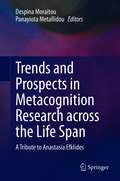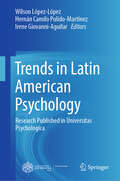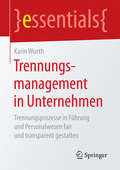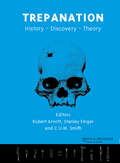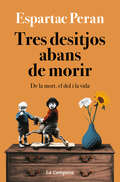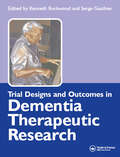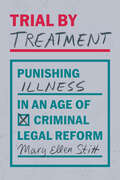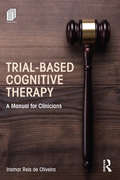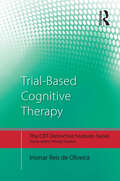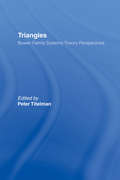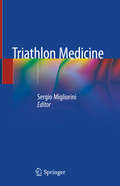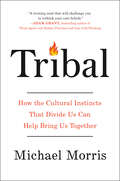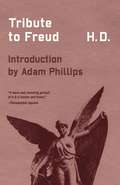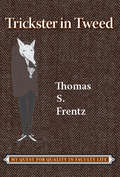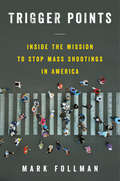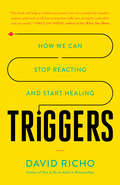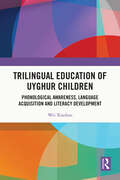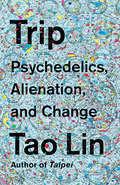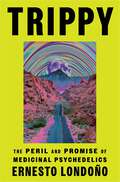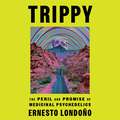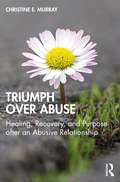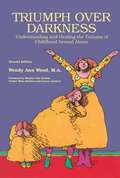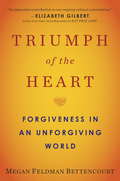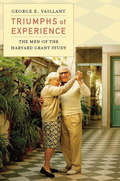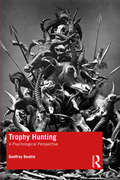- Table View
- List View
Trends and Prospects in Metacognition Research across the Life Span: A Tribute to Anastasia Efklides
by Despina Moraitou Panayiota MetallidouThis volume brings together trends and their prospects to understand the complexity of metacognitive phenomena, with emphasis on the interactions of metacognition with affect. It discusses the three perspectives in understanding these interactions: the possible mechanisms underlying them, the manifestation of interactions of metacognition with affect in self- and co-regulation in social and educational contexts, and changes during development in young children and older adults. This volume is a tribute to Professor Emerita Anastasia Efklides, who was among the pioneers to investigate and argue the importance of the interactions between metacognition and affect. It serves as a dedication to her contribution in the widening of the scope of research in metacognition and self-regulated learning.
Trends in Latin American Psychology: Research Published in Universitas Psychologica
by Wilson López-López Hernán Camilo Pulido-Martínez Irene Giovanni-AguilarThis book brings together English versions of a selection of articles originally published in Spanish in Universitas Psychologica, one of the most important psychology journals in Latin America. It&’s an anthology of theoretical and research papers published by important Latin American psychologists that aim to provide the international community with a representative sample of research trends in Latin American psychology in different subfields. This anthology is organized in three parts, each one containing a selection of articles from different subfields of psychological research and practice. The first part brings together papers in the fields of social and community psychology, two areas in which Latin American psychologists have developed quite original contributions to research and practice. The second part is dedicated to articles showcasing research conducted with Latin American children and youth in the fields of educational, cognitive and developmental psychology. Finally, the third part highlights articles that present contributions of research in fields such as neuropsychology, clinical and health psychology to the improvement of mental and physical health care of the Latin American population. Each part starts with an introduction especially written by the volume editors for this anthology. Trends in Latin American Psychology: Research Published in Universitas Psychologica will be of interest to researchers in many subfields of psychology, especially to those interested in international and cross-cultural psychology, as the book offers a significative sample of the best research done by Latin American psychologists. The translation of the original articles in Spanish into English was done with the help of artificial intelligence. A subsequent human revision was done primarily in terms of content.
Trennungsmanagement in Unternehmen: Trennungsprozesse in Führung und Personalwesen fair und transparent gestalten (essentials)
by Karin WurthKarin Wurth wendet sich in diesem essential an F#65533;hrungskr#65533;fte und Personalverantwortliche, die aktiv in Trennungsprozesse in Unternehmen eingebunden sind und den Umgang damit als Teil einer guten Unternehmensf#65533;hrung begreifen. Die Autorin zeigt, dass sich ein wertsch#65533;tzender, transparenter Umgang mit den beteiligten Anspruchsgruppen in Trennungsprozessen lohnt. Ein professioneller Trennungsprozess mit dem eigentlichen Trennungsgespr#65533;ch im Zentrum bildet die praktische Basis aller Ma#65533;nahmen, deren Steuerung als Trennungsmanagement bezeichnet wird. Sie erl#65533;utert, wie die Unternehmenskultur durch faires Verhalten in schwierigen Situationen gest#65533;rkt wird.
Trepanation (Studies on Neuropsychology, Development, and Cognition)
by Stanley Finger Robert Arnott C.U.M. SmithThis volume will look at the history of trepanation, the identification of skulls, the tools used to make the cranial openings, and theories as to why trepanation might have been performed many thousands of years ago.
Tres desitjos abans de morir: De la mort, el dol i la vida
by Espartac Peran«La mare ens havia demanat tres coses abans de morir. No en vam poder complir cap». Converses, viatges, molta vida i amor per curar aquelles ferides que la mort dels nostres estimats ens deixa a la pell. «A casa, la mort i el dol van seure amb tots a taula. Vaig créixer al costat d’uns pares marcats per la mort del seu primer fi ll. Era el meu germà gran. No el vaig poder conèixer, no vam coincidir en el temps, però és com si el conegués de tota la vida. La mort ens ha ocupat molts moments i pensaments. No esquivar-la ens ha fet aferrar amb força a la vida.». Espartac Peran i Masafrets (Mataró, 1972) És periodista i presentador de Televisió de Catalunya.Part de la infància i joventut la va viure al mercat de la plaça de Cuba de Mataró, entre xivarri, parades, bona gent, olors i viandes que alimentaven el pap i l’ànima. Al mercat, la família hi tenia la parada de peix on ell també va despatxar uns quants anys. D’aquell ambient de basar, tan viu i acolorit, n’ha heretat, com a poc, l’estima per la paraula i la passió per la comunicació. I entre boga i surell, els seus inicis des de ben jove en el món de la comunicació van ser en mitjans locals com ara Televisió de Mataró, Ràdio Argentona i Ràdio Arenys. A partir d’aquí va fer el salt a mitjans com Cadena 13, Catalunya Cultura, Catalunya Ràdio i Rac 1. I a l’horitzó, el desig de treballar a TV3.S’hi va estrenar a l’edició del TN vespre i el TN migdia. Més endavant va presentar el TN nit i les notícies al canal 3/24. També va presentar el Trànsit, el programa Els matins i el concurs Bocamoll.Durant vuit anys va estar al capdavant del magazín diari de tardes Divendres, cada setmana i en directe des d’una població diferent del país. Actualment forma part de la direcció del concurs Atrapa’m si pots, i el camí continua.
Trial Designs and Outcomes in Dementia Therapeutic Research
by Serge Gauthier Kenneth RockwoodGiven the increased attention of clinicians, researchers, and the pharmaceutical industry to the management and treatment of dementia not only in the elderly but also in increasingly younger populations, the demands for effective evidence-based pharmaceutical control of dementia and quantitative assessment of outcomes have increased. From the first steps in the early 1960s to the controversial landmark paper of Summers and colleagues to the most recent trials, it is clear both that much progress has been made and that much remains to be done. This book is written to take stock of what is now usefully known and to speculate on directions for the future.
Trial by Treatment: Punishing Illness in an Age of Criminal Legal Reform
by Mary Ellen StittA troubling account of the unexpected impacts of treatment-based alternatives to criminal punishment. Every year, courts send hundreds of thousands of people to treatment-based programs as alternatives to traditional punishment. These alternatives—known as ‘diversion programs’—are widely celebrated as reforms that reduce the punishment of the mentally ill. But in Trial by Treatment, Mary Ellen Stitt shows that they have, in fact, expanded the reach of the criminal legal system and its power over the lives of the most vulnerable. The inner workings of diversion programs are obscure, partially by design, and data on outcomes is hard to come by. Stitt draws on two years of fieldwork in criminal courtrooms and court-mandated treatment sessions, as well as an original national dataset, in-depth interviews, and experimental survey data, to document the hidden impacts of diversion. She shows that placing mental healthcare under the control of the courts has helped to legitimize the criminalization of illness, warped treatment environments, and amplified inequalities in punishment. In vivid and humanizing detail, Trial by Treatment shows how reforms that keep power and discretion in the same hands can entrench the very problems they promised to solve.
Trial-Based Cognitive Therapy: A Manual for Clinicians (Clinical Topics in Psychology and Psychiatry)
by Irismar Reis de OliveiraTrial-Based Cognitive Therapy presents a model that, although still inherently Beckian, organizes known cognitive and behavioral techniques in a step-by-step fashion in order to make cognitive therapy easier for the new therapist to learn, easier for patients to understand, and simpler to implement. Based on and backed up by a series of published studies, Trial-Based Cognitive Therapy lays out structured strategies for changing core beliefs about the self, and its clear, coherent, integrative conceptualization of psychopathology is presented as an easy-to-remember case-formulation model that is useful for both the therapist and the client. This book introduces a new approach, the Trial-Based Cognitive Therapy (TBCT), whose main technique, the Trial-Based Thought Record (TBTR), is a structured strategy to change core beliefs about the self and is presented as a law-centered analogy in which the therapist engages the client in a simulation of the judicial process. Perfect for psychotherapists at any level, Trial-Based Cognitive Therapy presents a balanced blend of theory advancement, scientific scrutiny of a new method, and practical application.
Trial-Based Cognitive Therapy: Distinctive features (CBT Distinctive Features)
by Irismar Reis de OliveiraTrial-Based Cognitive Therapy (TBCT) is a new model of cognitive behaviour therapy (CBT) that organizes standard cognitive and behavioural techniques in a step-by-step fashion, making CBT more easily mastered by the new therapist, more easily understood by the patients, and simpler to be implemented, whilst still maintaining flexibility and CBT’s recognized effectiveness. Dividing thirty key features into two parts: ‘Theory and Practice’, this concise book explores the principles of TBCT, explains the techniques developed throughout TBCT therapy to change dysfunctional cognitions, and provides a clear guide to the distinctive characteristics of TBCT. Trial-Based Cognitive Therapy will be of interest to psychiatrists, psychologists, social workers, therapists, counsellors and other professionals working in the field of mental health, plus those wanting to learn CBT. Trial-Based Cognitive Therapy is part of the Distinctive Features series, which asks leading practitioners and theorists of the main CBT therapies to highlight the main features of their particular developing approach. The series as a whole will be essential reading for psychotherapists, counsellors and psychologists of all orientations.
Triangles: Bowen Family Systems Theory Perspectives
by Peter TitelmanMove through emotional triangles toward a natural systems view of the individual in the context of the family and society Triangles: Bowen Family Systems Theory Perspectives presents clear applications of Murray Bowen&’s concept of the emotional triangle in the family, the organization, and society. This comprehensive book discusses in detail the theory, the theory&’s application to the therapist&’s own family, clinical applications, organizational applications, and societal applications. This unique resource examines the value of the triangle concept for understanding the emotional process of the family, the organization, and society. Triangles: Bowen Family Systems Theory Perspectives provides a theoretical context for understanding the triangle concept and its application, then progresses to exploring and applying the concept of the triangle and interlocking triangles to self, family, and other contexts. This book is devoted to explicating Bowen&’s seminal concept of the triangle, and providing a clear description of the process of detriangling in clinical practice. The text includes several case studies and vignettes to illustrate concepts. Topics in Triangles: Bowen Family Systems Theory Perspectives include: a historical and conceptual overview the triangle&’s function in the effort to increase differentiation of self the presence of triangles in non-human primates Bowen&’s differentiation of self effort in his own family and business the functioning of triangles at the time of chronic illness and death emotional triangles involving pets and humans the application of the concept of triangles and interlocking triangles to clinical issues in marriage the presence of triangles in the child-focused family triangles in stepfamilies the triangle&’s presence and function in families with substance abusing teens triangles involving extramarital relationships triangles in organizations and businesses the triangle&’s function in the context in societal emotional process and much more! Triangles: Bowen Family Systems Theory Perspectives is a stimulating, enlightening resource for family therapists, social workers, psychologists, pastoral counselors, and counselors.
Triathlon Medicine
by Sergio MiglioriniThis book offers an ultimate clinical guide to all the medical issues related to triathlon – a very popular Olympic and international sport, and the most modern of all the endurance activities. Triathletes experience a range of environmental conditions and physiological demands, depending on the race, that must be taken into consideration when preparing for medical assistance. The book addresses in detail the topics of cardiovascular adaptations, overuse injuries, overtraining syndrome, endurance anaemia, nutrition and the physiological aspects associated with the discipline. It provides information on the training and technical aspects of the different distances in triathlon disciplines, with a special focus on safety in open-water swimming. Dedicated chapters also cover issues related to female, young, master and para-triathletes. Combining research perspectives with many years of experience practicing in the field, this book offers sport medicine physicians, orthopedists, physical therapists and coaches a comprehensive guide to the evaluation, treatment and prevention of all the overuse conditions and to improving athletes’ performance.
Tribal: How the Cultural Instincts That Divide Us Can Help Bring Us Together
by Michael MorrisSHORTLISTED FOR THE FINANCIAL TIMES AND SCHRODERS BUSINESS BOOK OF THE YEAR A revelatory, paradigm-shifting work from a renowned Columbia professor and &“one of the great social and cultural psychologists&” (Amy Cuddy) that demystifies our tribal instincts and shows us how to use them to create positive change.Tribalism is our most misunderstood buzzword. We&’ve all heard pundits bemoan its rise, and it&’s been blamed for everything from political polarization to workplace discrimination. But as acclaimed cultural psychologist and Columbia professor Michael Morris argues, our tribal instincts are humanity&’s secret weapon. Ours is the only species that lives in tribes: groups glued together by their distinctive cultures that can grow to a scale far beyond clans and bands. Morris argues that our psychology is wired by evolution in three distinctive ways. First, the peer instinct to conform to what most people do. Second, the hero instinct to give to the group and emulate the most respected. And third, the ancestor instinct to follow the ways of prior generations. These tribal instincts enable us to share knowledge and goals and work as a team to transmit the accumulated pool of cultural knowledge onward to the next generation. Countries, churches, political parties, and companies are tribes, and tribal instincts explain our loyalties to them and the hidden ways that they affect our thoughts, actions, and identities. Rather than deriding tribal impulses for their irrationality, we can recognize them as powerful levers that elevate performance, heal rifts, and set off shockwaves of cultural change.Weaving together deep research, current and historical events, and stories from business and politics, Morris cuts across conventional wisdom to completely reframe how we think about our tribes. Bracing and hopeful, Tribal unlocks the deepest secrets of our psychology and gives us the tools to manage our misunderstood superpower.
Tribute to Freud (Second Edition)
by Hilda Doolittle Norman Holmes Pearson Adam PhilipsA classic of American literature, now with a new introduction by iconic author and psychotherapist Adam Phillips. "My bat-like thought-wings would beat painfully in that sudden searchlight," H.D. writes in Tribute to Freud, her moving memoir. Compelled by historical as well as personal crises, H.D. underwent therapy with Freud during 1933-34, as the streets of Vienna were littered with tokens dropped like confetti on the city stating "Hitler gives work," "Hitler gives bread." Having endured World War I, she was now gathering her resources to face the cataclysm she knew was approaching. The first part of the book, "Writing on the Wall," was composed some ten years after H.D.'s stay in Vienna; the second part, "Advent," is a journal she kept during her analysis. Revealed here in the poet's crystal shard-like words and in Freud's own letters (which comprise an appendix) is a remarkably tender and human portrait of the legendary Doctor in the twilight of his life. Time double backs on itself, mingling past, present, and future in a visionary weave of dream, memory, and reflections.
Trickster in Tweed: The Quest for Quality in a Faculty Life (Writing Lives: Ethnographic Narratives)
by Thomas S FrentzHow do academics survive the bureaucracy, the petty jealousies, the absurdities of operating in the university? More important, how do they, as humans, cope with the darker shadows that enter professional lives-- illness, sorrow, death? Coyote, The Trickster, a well known figure in the American Indian world, is also the icon for communication scholar Tom Frentz. Frentz uses the survival strategies of The Trickster in his articulate, amusing, and often emotional autoethnography of striving for quality through the worlds of academia and medicine.
Trigger Points: Inside the Mission to Stop Mass Shootings in America
by Mark Follman"An urgent read that illuminates real possibility for change.” —John Carreyrou, New York Times bestselling author of Bad BloodFor the first time, a story about the specialized teams of forensic psychologists, FBI agents, and other experts who are successfully stopping mass shootings—a hopeful, myth-busting narrative built on new details of infamous attacks, never-before-told accounts from perpetrators and survivors, and real-time immersion in confidential threat cases, casting a whole new light on how to solve a grievous problemIt's time to go beyond all the thoughts and prayers, misguided blame on mental illness, and dug-in disputes over the Second Amendment. Through meticulous reporting and panoramic storytelling, award-winning journalist Mark Follman chronicles the decades-long search for identifiable profiles of mass shooters and brings readers inside a groundbreaking method for preventing devastating attacks. The emerging field of behavioral threat assessment, with its synergy of mental health and law enforcement expertise, focuses on circumstances and behaviors leading up to planned acts of violence—warning signs that offer a chance for constructive intervention before it's too late.Beginning with the pioneering study in the late 1970s of "criminally insane" assassins and the stalking behaviors discovered after the murder of John Lennon and the shooting of Ronald Reagan in the early 1980s, Follman traces how the field of behavioral threat assessment first grew out of Secret Service investigations and FBI serial-killer hunting. Soon to be revolutionized after the tragedies at Columbine and Virginia Tech, and expanded further after Sandy Hook and Parkland, the method is used increasingly today to thwart attacks brewing within American communities.As Follman examines threat-assessment work throughout the country, he goes inside the FBI's elite Behavioral Analysis Unit and immerses in an Oregon school district's innovative violence-prevention program, the first such comprehensive system to prioritize helping kids and avoid relying on punitive measures. With its focus squarely on progress, the story delves into consequential tragedies and others averted, revealing the dangers of cultural misunderstanding and media sensationalism along the way. Ultimately, Follman shows how the nation could adopt the techniques of behavioral threat assessment more broadly, with powerful potential to save lives.Eight years in the making, Trigger Points illuminates a way forward at a time when the failure to prevent mass shootings has never been more costly—and the prospects for stopping them never more promising.
Triggers: How We Can Stop Reacting and Start Healing
by David RichoWork with your triggers to find peace in the painful moments and lasting emotional well-being.Psychotherapist David Richo examines the science of triggers and our reactions of fear, anger, and sadness. He helps us understand why our bodies respond before our minds have a chance to make sense of a situation. By looking deeply at the roots of what provokes us--the words, actions, and even sensory elements like smell--we find opportunities to understand the origins of our triggers and train our bodies to remain calm in the face of traumatic experiences. In-the-moment exercises on how to process difficult emotions and physical manifestations are offered throughout the book to cultivate the inner resources necessary to deal with recurring trauma. When we are triggered, Richo writes, "we are being bullied by our own unfinished business." Explore what your body's knee-jerk reactions to trauma can teach you. Triggers: How We Can Stop Reacting and Start Healing acts as a guide to your body's powerful responses, helping you to remain calm under pressure and discover the key to emotional healing.
Trilingual Education of Uyghur Children: Phonological Awareness, Language Acquisition and Literacy Development
by Wei XiaobaoGiven the differences in the orthographic structure of the Uyghur, Chinese and English languages, this study used a mixed-method approach to systematically describe and analyze the phonological awareness of Uyghur bilingual children as English learners and its contributions to their trilingual literacy acquisition and development.Focusing on the development of these learners' phonological awareness in Uyghur, Chinese and English, this study explored the influences of Uyghur and Chinese learning on the formation of their English phonological awareness and the roles of different components of phonological awareness in their trilingual literacy development. Based on the characteristics of the phonetic structure in Uyghur, Chinese and English and the development of Uyghur children's phonological awareness in these languages, a Chinese phonetic identification training and Uyghur–Chinese–English comprehensive phonetic training program (including intensive phoneme category contrast training and phonics training) was designed to explore whether such targeted phonetic identification training can effectively improve these children's phonological awareness in Chinese and English and thus further promote their trilingual literacy development.This book will appeal to researchers and students interested in the fields of psycholinguistics, language acquisition and multilingual education.
Trip: Psychedelics, Alienation, and Change
by Tao LinPart memoir, part history, part journalistic exposé, Trip is a look at psychedelic drugs, literature, and alienation from one of the twenty-first century's most innovative novelists--The Electric Kool-Aid Acid Test for a new generation. A Vintage Original.While reeling from one of the most creative--but at times self-destructive--outpourings of his life, Tao Lin discovered the strange and exciting work of Terence McKenna. McKenna, the leading advocate of psychedelic drugs since Timothy Leary, became for Lin both an obsession and a revitalizing force. In Trip, Lin's first book-length work of nonfiction, he charts his recovery from pharmaceutical drugs, his surprising and positive change in worldview, and his four-year engagement with some of the hardest questions: Why do we make art? Is the world made of language? What happens when we die? And is the imagination more real than the universe?In exploring these ideas and detailing his experiences with psilocybin, DMT, salvia, and cannabis, Lin takes readers on a trip through nature, his own past, psychedelic culture, and the unknown.
Trippy: The Peril and Promise of Medicinal Psychedelics
by Ernesto LondoñoA moving, tender and thoughtful exploration of a complicated subject. Johann Hari, Sunday Times bestselling author of Stolen Focus and Lost ConnectionsA compulsively readable romp through a burgeoning scene that has immense potential for both harm and healing.Dan Harris, New York Times bestselling author of 10% Happier and host of the Ten Percent Happier podcastCourageous and revelatory... This journey inside the brain and around the world taught me more than any book I've read in a long time. It's an important book, one that will save people's lives.Benjamin Moser, Pulitzer Prize winning author of Sontag: Her Life and WorkWhen he signed up for a psychedelic retreat deep in the Brazilian rainforest, veteran New York Times journalist Ernesto Londoño was so depressed that he had come close to attempting suicide just weeks earlier. To his astonishment, the nine-day ayahuasca experience provided Londoño an instant reprieve from his depression and became the genesis of a personal transformation that anchors this sweeping exploration of the booming field of medicinal psychedelics. Londoño's deeply researched and brilliantly reported account introduces readers to a dazzling array of psychedelic enthusiasts who are upending our understanding of trauma and healing. From Indigenous elders who regard psychedelics as portals to the spirit world to religious leaders using mind-bending substances as sacraments, as well as war veterans who credit psychedelics with alleviating their PTSD, and clinicians trying to resurrect a promising field of medicine hastily abandoned in when the War on Drugs was announced in the 1970s.Trippy is the definitive book of psychedelics and mental health today, an in-depth and nuanced look at this booming industry which makes sense of the perils, limitations and promise of turning to psychedelics in the pursuit of healing.
Trippy: The Peril and Promise of Medicinal Psychedelics
by Ernesto LondoñoA moving, tender and thoughtful exploration of a complicated subject. Johann Hari, Sunday Times bestselling author of Stolen Focus and Lost ConnectionsA compulsively readable romp through a burgeoning scene that has immense potential for both harm and healing.Dan Harris, New York Times bestselling author of 10% Happier and host of the Ten Percent Happier podcastCourageous and revelatory... This journey inside the brain and around the world taught me more than any book I've read in a long time. It's an important book, one that will save people's lives.Benjamin Moser, Pulitzer Prize winning author of Sontag: Her Life and WorkWhen he signed up for a psychedelic retreat deep in the Brazilian rainforest, veteran New York Times journalist Ernesto Londoño was so depressed that he had come close to attempting suicide just weeks earlier. To his astonishment, the nine-day ayahuasca experience provided Londoño an instant reprieve from his depression and became the genesis of a personal transformation that anchors this sweeping exploration of the booming field of medicinal psychedelics. Londoño's deeply researched and brilliantly reported account introduces readers to a dazzling array of psychedelic enthusiasts who are upending our understanding of trauma and healing. From Indigenous elders who regard psychedelics as portals to the spirit world to religious leaders using mind-bending substances as sacraments, as well as war veterans who credit psychedelics with alleviating their PTSD, and clinicians trying to resurrect a promising field of medicine hastily abandoned in when the War on Drugs was announced in the 1970s.Trippy is the definitive book of psychedelics and mental health today, an in-depth and nuanced look at this booming industry which makes sense of the perils, limitations and promise of turning to psychedelics in the pursuit of healing.
Triumph Over Abuse: Healing, Recovery, and Purpose after an Abusive Relationship
by Christine E. MurrayIn this book Christine Murray carefully weaves her personal experiences as a survivor with her professional expertise as a counselor, community advocate, and researcher into a comprehensive guidebook for survivors of abuse. Moving forward after suffering abuse at the hands of someone who is supposed to love and care for you is no easy feat. And yet, healing and recovering from past abuse is possible, and the journey to get there can be an empowering opportunity for growth. Triumph Over Abuse provides a road map for doing more than simply moving on from the past. Filled with accessible case studies and exercises, the book offers extensive practical guidance on a range of topics, such as building coping skills, surrounding yourself with the right kinds of support, working through traumatic memories, and channeling your experience into helping others and making a difference in the world. The book will inspire and equip survivors of abuse to build full, meaningful lives despite the trauma they have faced, as well as being a tool for clinicians to use to support clients.
Triumph Over Darkness: Understanding and Healing the Trauma of Childhood Sexual Abuse
by Wendy Ann WoodThis collection of prose and therapeutic insights creates a powerful commentary on incest, rape, abuse, and the recovery process. Women and men share their personal experiences of childhood abuse and walk with the reader along the path toward wellness. They reflect each stage of healing with a clarity that, while often painful, is also hopeful. Addressing various aspects of abuse, including ritualistic abuse, multiple personality disorder, and partnering as well as providing a therapist's insights on the stages of healing, Triumph Over Darkness helps readers to understand recovery as a predictable process and see that healing is possible.
Triumph of the Heart: Forgiveness in an Unforgiving World
by Megan Feldman BettencourtWhen Megan Feldman Bettencourt found herself embittered after a breakup and a string of professional setbacks, she met an extraordinary man named Azim. <P><P>Azim had forgiven the man who killed his beloved only son, and even reached out to the killer's family. He truly seemed to be at peace. As a veteran journalist, Megan recognized it for the amazing story it was. But as a self-admitted grudge-holder, she was perplexed. Was there something wrong with him, or was there something wrong with her? She wondered about our ability to forgive--why we have it at all, why we do it, and whether it can help us. Triumph of the Heart is the story of Megan's quest to understand this complex concept, from both a scientific perspective and a human one. She draws on cutting-edge research showing that forgiveness can provide a range of health benefits, from relieving depression to decreasing high blood pressure. <P>She examines situations as mundane as road rage, as painful as cheating spouses, and as unthinkable as war crimes. Through stories of people and even communities who have forgiven in the toughest of circumstances, she shows us how they're able to do it, the profound sense of freedom they feel afterward, and the evocative implications for peacemaking worldwide. This journey takes Megan from recovered addicts who restarted their lives by seeking forgiveness, to a Baltimore principal who used forgiveness techniques to eradicate violence in her school, to genocide survivors in Rwanda who forgave the people who killed their families and perpetrators who are still trying to redeem themselves. Along the way, Megan strengthens her own powers of forgiveness, altering her life in ways she never expected. With grace and compassion, she reveals that our human capacity for forgiveness not only makes us healthier and happier, but is the key to healing, growing, and living well.From the Hardcover edition.
Triumphs of Experience: The Men of the Harvard Grant Study
by George E. VaillantAt a time when many people around the world are living into their tenth decade, the longest longitudinal study of human development ever undertaken offers some welcome news for the new old age: our lives continue to evolve in our later years, and often become more fulfilling than before. Begun in 1938, the Grant Study of Adult Development charted the physical and emotional health of over 200 men, starting with their undergraduate days. The now-classic Adaptation to Life reported on the menâs lives up to age 55 and helped us understand adult maturation. Now George Vaillant follows the men into their nineties, documenting for the first time what it is like to flourish far beyond conventional retirement. Reporting on all aspects of male life, including relationships, politics and religion, coping strategies, and alcohol use (its abuse being by far the greatest disruptor of health and happiness for the studyâs subjects), Triumphs of Experience shares a number of surprising findings. For example, the people who do well in old age did not necessarily do so well in midlife, and vice versa. While the study confirms that recovery from a lousy childhood is possible, memories of a happy childhood are a lifelong source of strength. Marriages bring much more contentment after age 70, and physical aging after 80 is determined less by heredity than by habits formed prior to age 50. The credit for growing old with grace and vitality, it seems, goes more to ourselves than to our stellar genetic makeup.
Trophy Hunting: A Psychological Perspective
by Geoffrey BeattieThis book explores the psychology of trophy hunting from a critical perspective and considers the reasons why some people engage in the controversial activity of killing often endangered animals for sport. Recent highly charged debate, reaching a peak with the killing of Cecil the lion in 2015, has brought trophy hunting under unprecedented public scrutiny, and yet the psychology of trophy hunting crucially remains under-explored. Considering all related issues from the evolutionary perspective and ‘inclusive fitness’, to personality and individual factors like narcissism, empathy, and the Duchenne smiles of hunters posing with their prey, Professor Beattie makes connections between a variety of indicators of prestige and dominance, showing how trophy hunting is inherently linked to a desire for status. He argues that we need to identify, analyse and deconstruct the factors that hold the behaviour of trophy hunting in place if we are to understand why it continues, and indeed why it flourishes, in an age of collapsing ecosystems and dwindling species populations. The first book of its kind to examine current research critically to determine whether there really is an evolutionary argument for trophy hunting, and what range of motivations and personality traits may be linked to this activity. This is essential reading for students and academics in psychology, geography, business, environmental studies, animal welfare as well as policy makers and charities in these and related areas. It is of major relevance for anyone who cares about the future of our planet and the species that inhabit it.
